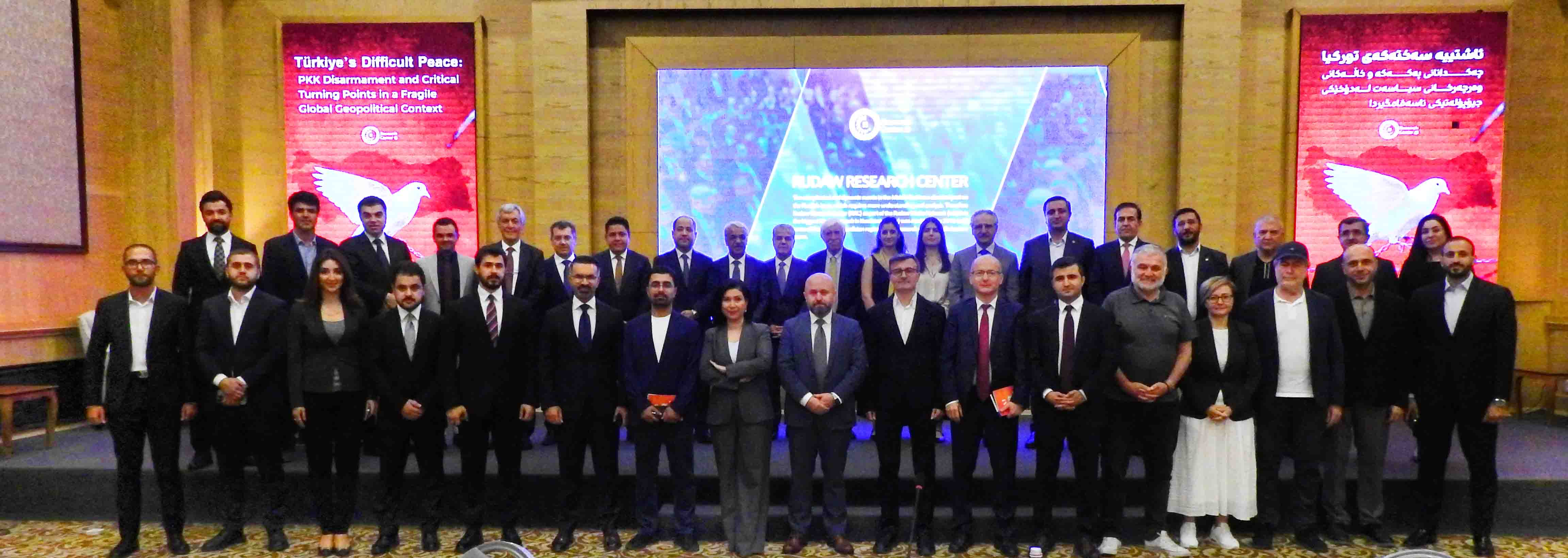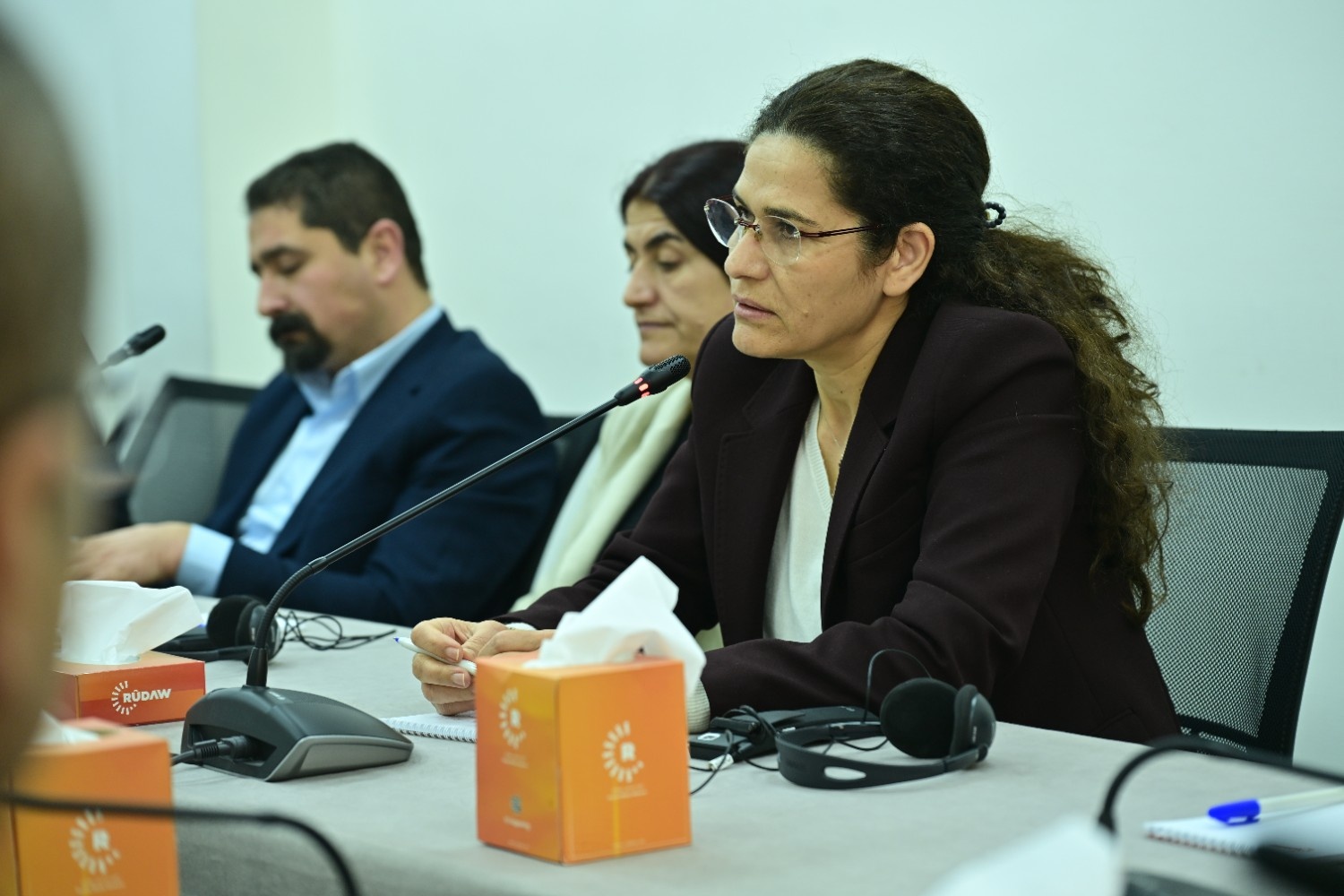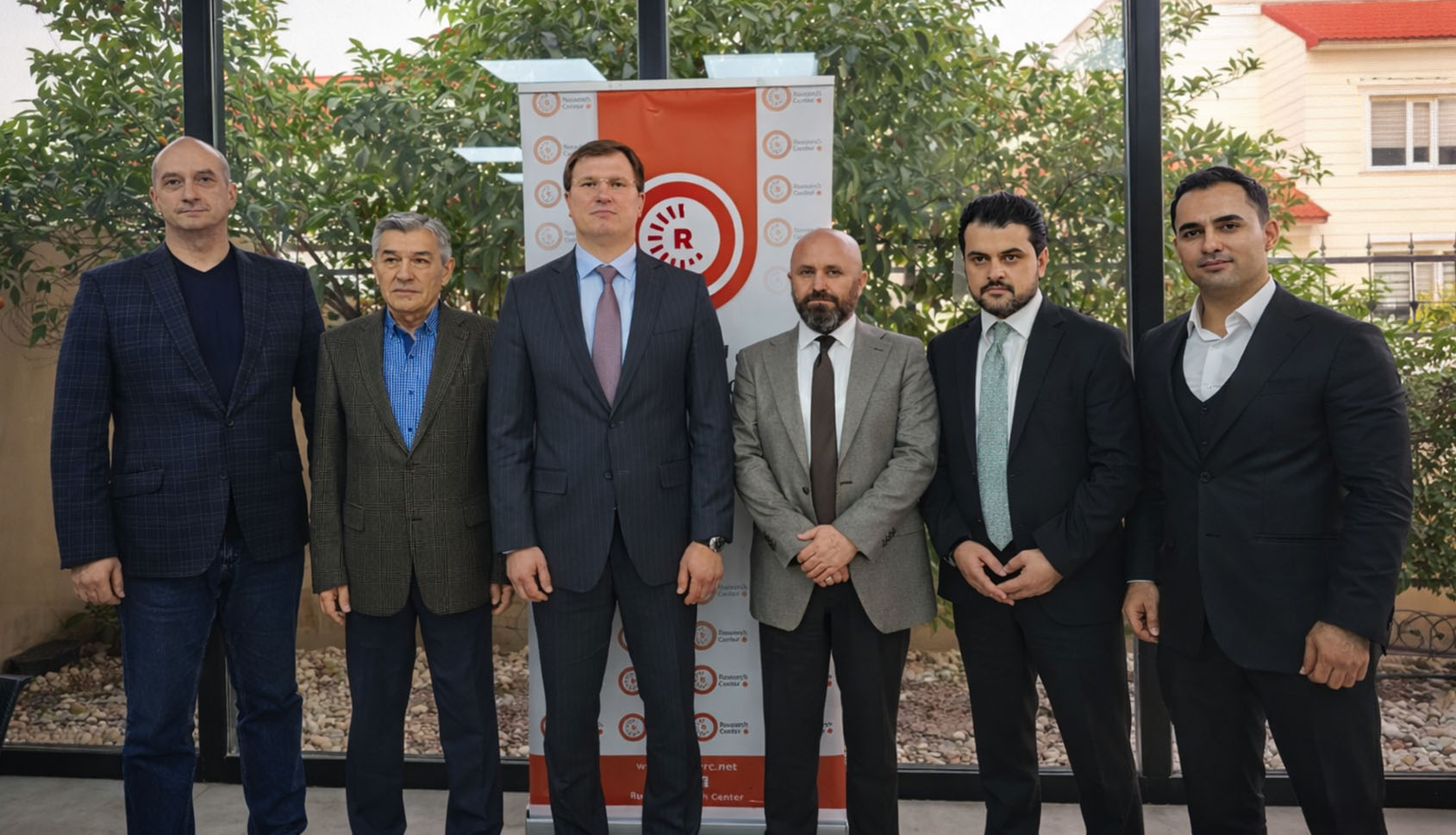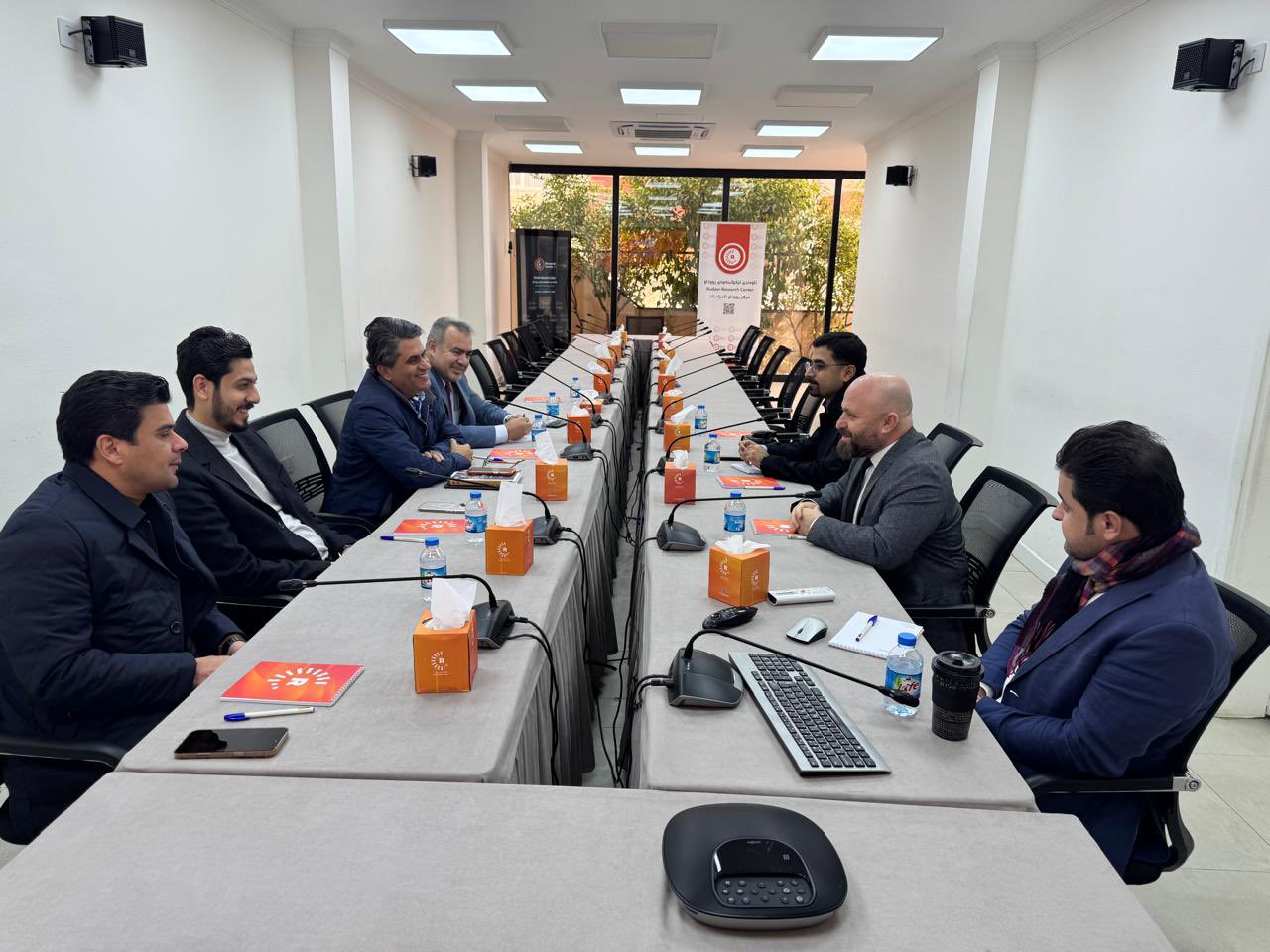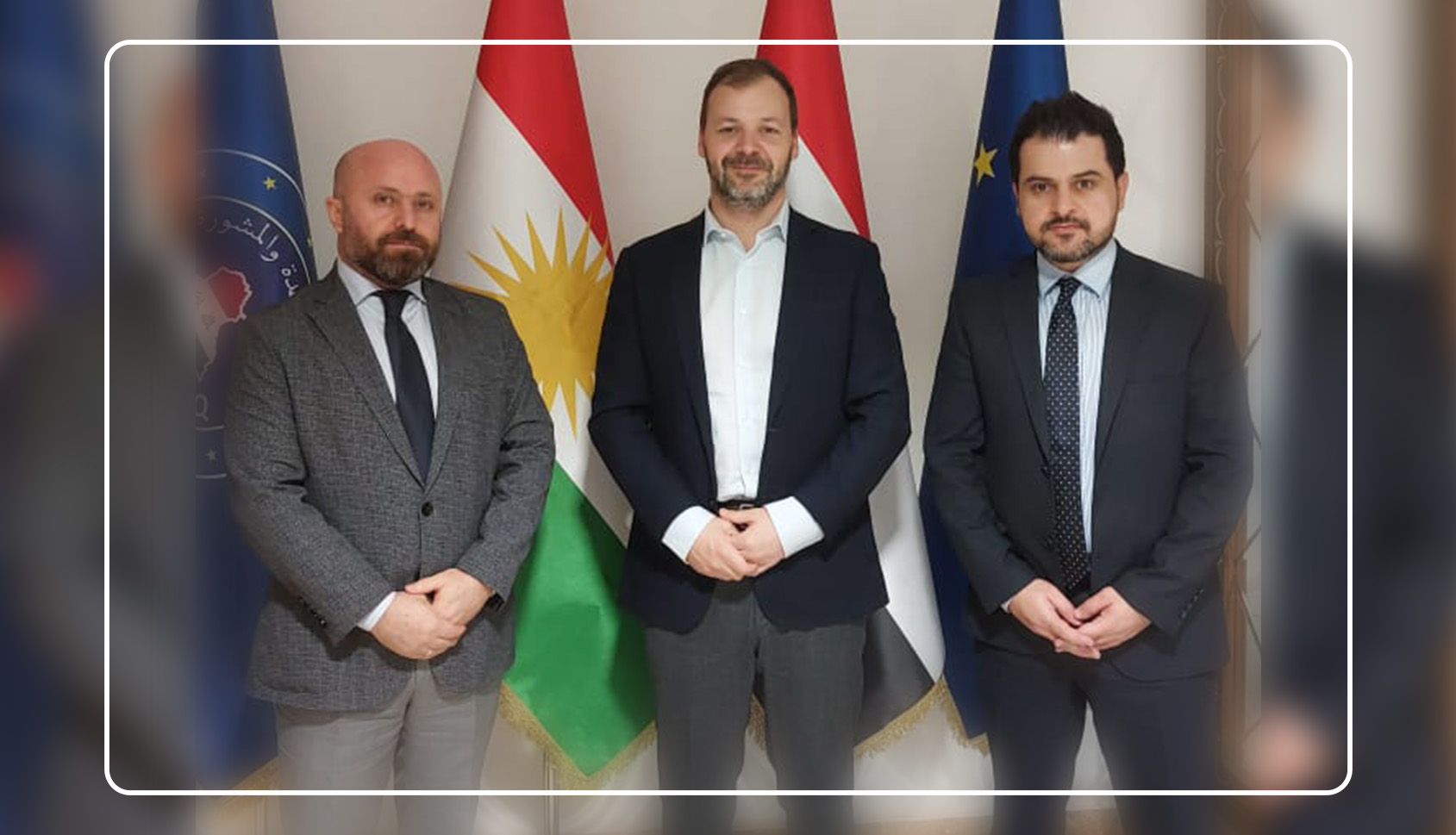On Monday, September 1, 2025, the Rudaw Research Center organized an event titled “Türkiye’s Difficult Peace: PKK Disarmament and Critical Turning Points in a Global Geopolitical Context.” The discussions focused on the dynamics of PKK disarmament as well as the repositioning and transformation of domestic politics in the Republic of Türkiye.
The event consisted primarily of opening and welcome speeches, an open panel, and a closed roundtable held under the Chatham House Rule.
Ako Mohammed, CEO of Rudaw Media Network, opened the conference with welcoming remarks. This was followed by a speech from Mehdi Eker, former Minister of Agriculture of the Republic of Türkiye, who spoke about negotiations on PKK disarmament. Mithat Sancar, parliamentarian from the DEM Party and member of the İmralı delegation, then shared his perspective. Finally, a special message from Abdullah Öcalan, the imprisoned leader of the PKK, was read aloud—a message prepared specifically for this Rudaw Research Center event.
The open panel session, moderated by Hevidar Zana of Rudaw Media Network, featured discussions by several prominent figures: Bülent Kaya, parliamentarian from the Felicity Party and member of the “National Solidarity, Brotherhood and Democracy Commission”; Oğuz Kaan Salıcı, parliamentarian from the Republican People’s Party (CHP), Istanbul; Cengiz Çandar, parliamentarian from the People’s Democratic Party (DEM), Amed; Mala Bakhtiyar, politician; Roj Girasun, General Director of the Turkish Research Center (RAWEST); and Bayram Bozyel, President of the Kurdistan Socialist Party (PESEKE). They addressed a wide range of issues regarding the resolution process and the disarmament of the PKK.
In the closed roundtable session, held under the Chatham House Rule and moderated by Ziryan Rojhelati, Director of the Rudaw Research Center, several key regional and domestic topics were discussed concerning the peace process and PKK disarmament. From a regional perspective, participants examined how neighboring states and influential regional powers perceive the disarmament process; the role and influence of the Kurdistan Region and Iraq; and the impact of developments in Rojava, Syria, and Sinjar on the process—whether they serve as facilitators or obstacles.
From a domestic perspective, the roundtable explored ways to ensure stability and build confidence in the Republic of Türkiye’s future. Topics included: internal debates on whether to continue or end armed conflict between the state and the PKK; the reforms and changes required for a successful disarmament process; the capacity of the political system to address Kurdish demands; and lessons learned from previous resolution attempts.
Opening and Welcome Remarks
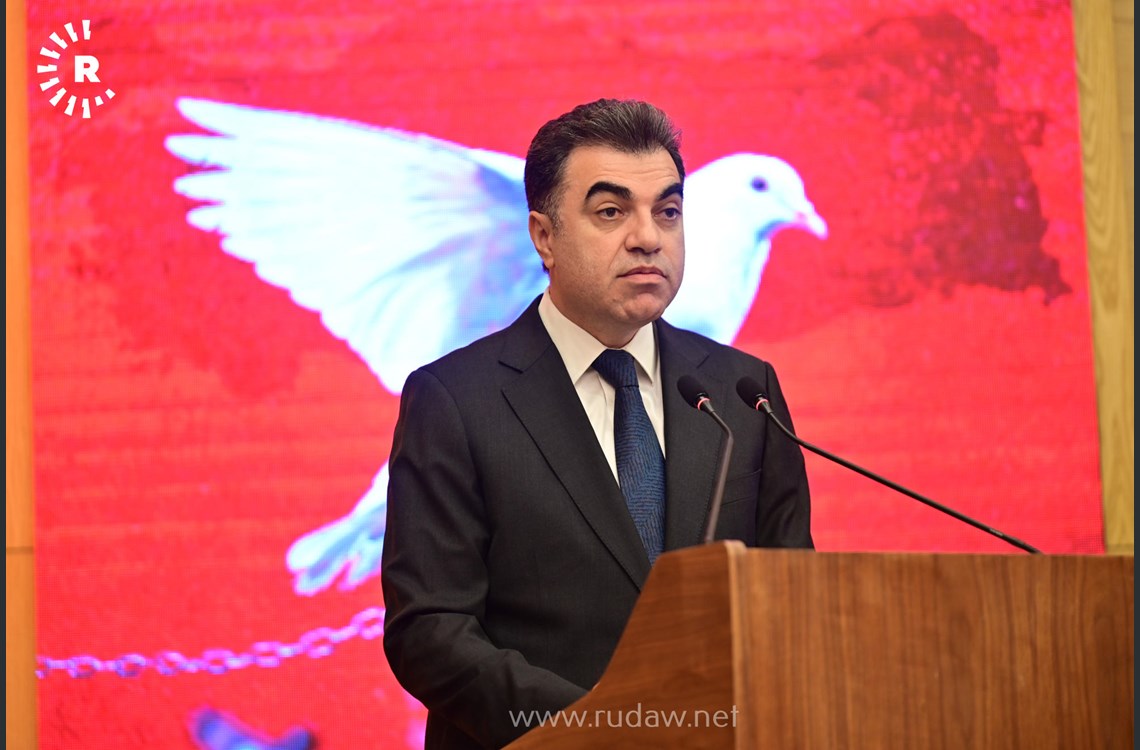
Ako Mohammed, CEO of Rudaw Media Network
Distinguished Attendees,
Today is recognized as Peace Day in many parts of the Republic of Türkiye, and September 21 is also observed as the International Day of Peace. Our conference today is dedicated to peace, under the title “Türkiye’s Difficult Peace: PKK Disarmament and Critical Turning Points in a Global Geopolitical Context.”
I welcome you all—those who have come from the Republic of Türkiye and those joining us from the Kurdistan Region—for this important discussion. I also extend my gratitude to the Rudaw Research Center for bringing us together.
Those who speak of peace and work toward peace are beloved by God and supported by the people. Public support for peace in the Republic of Türkiye is very strong and has only grown. The most recent poll, conducted two months ago, showed 68% of people in favor of peace. This figure demonstrates a broad social movement in Türkiye that courageously advocates for peace. Support for peace is also widespread across Kurdistan. For instance, in some villages along the border of the Kurdistan Region, residents have celebrated the end of war by beginning to rebuild their homes. The leadership of the Kurdistan Region, along with people from all sectors of society, has shown extraordinary commitment to peace. This popular support is a powerful force in ensuring the success and sustainability of the peace process.
The process initiated by His Excellency Recep Tayyip Erdoğan, President of the Republic of Türkiye, together with His Excellency Abdullah Öcalan, has aimed to end conflict and build lasting peace and stability. This initiative has created a hopeful atmosphere throughout the region, paving the way for peaceful coexistence. The process not only reduces the ground for racism but also expands opportunities for cooperation. It represents more than a political development; it is a moral and social transformation.
Peace requires courage. The victories of war are temporary, but peace is a lasting triumph. Those managing this process in the Republic of Türkiye are taking great pride in their historical achievements and in building a just peace for the people of the region. Leaders in the Kurdistan Region are likewise contributing to a brighter future through their efforts in support of the process.
Several members of the Turkish Parliament are present at today’s conference. Their participation marks an important moment, giving them the opportunity to play a role in shaping a historic phase of reconciliation in the Republic of Türkiye.
No just cause or people should fear peace, for peace is the foundation of progress. It is not a sign of weakness, but of strength. A sustainable peace based on rights, justice, and equality can ensure stability and prosperity across the region.
We hope that by next year’s International Peace Day, we will gather again in a region free of war and celebrate the complete success of this peace process. Once again, welcome to Erbil, the capital of the Kurdistan Region, and thank you for your participation.
Mehdi Eker, Former Minister of Agriculture of the Republic of Türkiye
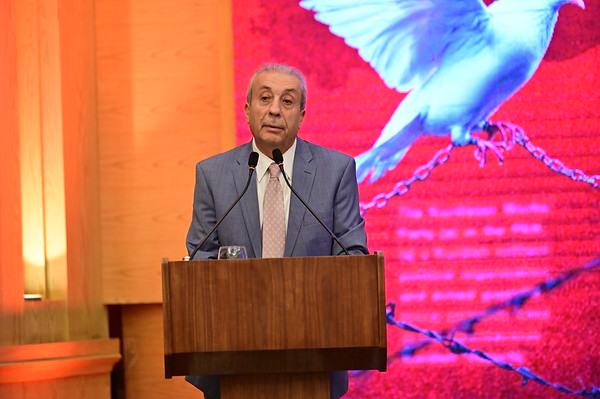
The second speech of the conference was delivered by Mehdi Eker, former Minister of Agriculture of the Republic of Türkiye, who addressed the resolution process. He stated: "We are going through a critical process, not only in the Middle East, but also in the Black Sea and Mediterranean regions, where wars and conflicts continue, which are part of our geography."
Mehdi Eker emphasized: "Amid the pain and suffering of the region, there is a positive development in the Republic of Türkiye that gladdens our hearts and increases our hope. Then [it makes no difference] whether they call it Türkiye without terror or the peace process."
The former Turkish minister discussed the background of past conflicts between Kurds and the Turkish state, saying: "What is happening in the region did not emerge suddenly, so we need to discuss the history of events as well."
According to Mehdi Eker, the effects of World War I continue, whose target was "the Middle East and Mesopotamia." He added: "The Europeans planned to take our income and oil and establish their industries in Europe."
The former Minister of Agriculture stressed that the European Union continues to divide the Middle East, stating: "We must not forget this truth - the Israeli government is the main cause."
The new resolution process began on October 1st with the initiative of Devlet Bahçeli, leader of the MHP party. Later, Abdullah Öcalan, on February 27th of this year, called on the PKK to convene a congress and lay down arms.
The former Minister of Agriculture of the Republic of Türkiye indicated that when the PKK was formed, there was no other alternative that people could wholeheartedly support; also, many mistakes by the state contributed to the PKK’s growth.
Mehdi Eker said: "Instead of the state listening to the people's pain and demands, they oppressed them, forcing them to abandon their villages and migrate. In big cities, they faced waves of racism."
In May of this year, the PKK decided to end its armed struggle. On July 11th, 30 PKK guerrillas symbolically burned their weapons in Sulaymaniyah province.
The former Turkish minister said: "The peace process can unite everyone into one great people. If we think of our common values, our common culture, and our religious values, and do not consider artificial boundaries, we can be strong once again, and the process can become a process of reconstruction."
According to Mehdi Eker, during the war years when villages were abandoned and people faced oppression, "they did not go to Dohuk and Mahabad, but went to other cities of their own country like Mardin, Antalya, and Istanbul, because they knew that a day like today [for the peace process] would come. As much as Kirkuk is Turkish, Istanbul is equally Kurdish."
Mehdi Eker referred to the issue of PKK disarmament and said: "First, the weapons must be silenced. The PKK's disarmament makes the Republic of Türkiye stronger, so there needs to be dialogue in a brotherly and friendly manner."
According to the former Minister of Agriculture of the Republic of Türkiye, some parties inside and outside the country see the peace process as a threat to their interests, and "they do whatever they can to create obstacles to peace. Some of them even make promises to Kurds, but Kurds are tired of promises."
Mehdi Eker concluded about the peace process: "There is only one path before us, and that is peace and brotherhood."
Message from Abdullah Öcalan and a remark by Mithat Sancar, Member of the İmralı Delegation of the DEM Party and Former Co-chair of the HDP
Abdullah Öcalan, the imprisoned leader of the PKK, conveyed a message to the "Türkiye's Difficult Peace" conference: "I propose that Kurds adapt themselves to those states that provide them with the opportunity for democratic society relations."
Abdullah Öcalan stated in his message: "I congratulate the Rudaw Research Center for organizing this conference, especially as its title is (Türkiye's Difficult Peace). This title reflects realities. In our 40-year experience of the past, we have seen several times through bitter experience the difficulty of achieving peace and the conditions for peace to emerge."
The imprisoned PKK leader called for the disarmament of PKK guerrillas at the end of February this year as an effort to reach a peace process. In his message, he stated: "I propose that Kurds adapt themselves to those states that provide them with the opportunity for democratic society relations. I define this as 'unification based on a democratic society.'"
Abdullah Öcalan's message was read at the Rudaw Research Center conference by Mithat Sancar, a member of the Turkish Parliament and member of the İmralı delegation of the DEM Party.
Text of Abdullah Öcalan's Message
Distinguished participants,
I extend my greetings and respect to you.
I congratulate the Rudaw Research Center for organizing this conference, particularly with its title "Türkiye's Difficult Peace."
This title reflects realities. In our past 40 years of experience, we have witnessed several times through bitter experience that achieving peace in the Republic of Türkiye is a difficult task.
This time too, we have "hardly obtained" the opportunity for peace, but with all our awareness and capabilities, we strive to bring this opportunity to fruition.
If this process succeeds in the Republic of Türkiye, the fate of the entire Middle East will change; a new era will begin where a democratic life based on peace will replace war and destruction.
My proposal is that the Kurds align themselves with those states that provide them with the opportunity for democratic society relations. I define this as "unification on the basis of democratic society."
I tie this process that we are conducting to this foundation and believe it will also be successful.
In my opinion, relations among Kurds should also be based on the principle of democratic unity. I call upon all Kurds to come together and unite on democratic ground.
With hopes that your conference will proceed successfully, I present my greetings and respect from the depths of my heart.
Abdullah Öcalan
İmralı Island
Mithat Sancar, Member of DEM Party's İmralı Delegation and Former Co-Chair of HDP
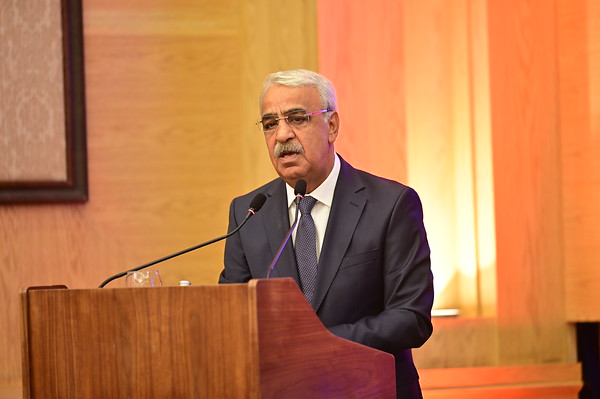
Mithat Sancar, member of the DEM Party's İmralı delegation and former co-chair of the HDP, delivered the third speech at the conference as part of the DEM Party's delegation for meetings with Abdullah Öcalan. He stated: "The resolution and peace process is difficult not only in the Republic of Türkiye but throughout the world."
In his speech, Mithat Sancar emphasized that peace is a challenging process worldwide, adding: "Bitter experiences tell us how important peace is. Our failure to achieve peace after many years has caused us deep and profound pain. Therefore, when we talk about peace, we know it requires great patience and endurance."
Speaking on the current peace process, Sancar noted: "Ten months have passed since the beginning of the process. On October 1st of last year, Mr. Devlet Bahçeli, Chairman of the MHP, came to us after the first parliamentary session. He met with our co-chairs and parliamentarians. That was the first signal of the beginning and interpretation of the process. Later, Bahçeli presented his famous speech on October 22nd and announced the start of the initiative."
The DEM Party İmralı delegation member continued describing the later stages of the process: "Subsequently, a DEM Party delegation visited İmralı. On February 27, 2025, Öcalan's message of 'Peace and Democratic Society' was published, which was a historic turning point and signaled a new beginning in which he called for the PKK's dissolution and disarmament. The PKK implemented Öcalan's call and organized its 12th Congress on May 5–7, announcing the decision for dissolution and disarmament."
Mithat Sancar also referred to the burning of weapons by some PKK guerrillas on July 11, saying: "We believe this was a strong demonstration of commitment to Öcalan's message, who is the founder of the PKK; it was also an important message from the PKK expressing its readiness for disarmament. After that phase, attention turned to parliament, a commission was established, and they held their first meeting on August 5, 2025. Their activities continue now. I reiterate, peace is a difficult path but a very important goal."
The DEM Party İmralı delegation member explained further: "To better understand the Republic of Türkiye's peace process, I will shed light on several points. The peace process that is currently ongoing is contrary to the characteristics of similar peace processes elsewhere. In achieving peace in most countries, disarmament is discussed or implemented at the final stage, meaning there is first dialogue and negotiation, agreement and understanding, and preparation. Finally, a decision on disarmament is made."
Mithat Sancar stressed: "In this process, the issue of disarmament has been placed as the first priority of all activities and different phases. Placing the disarmament phase before all other phases and steps is completely contrary to other peace processes worldwide."
Turning to the broader context, Sancar said: "For a long time, the Middle East has been in the midst of various crises and complications. For two years, war, bloodshed, and killing have been witnessed in the Middle East. We live between enduring a very harsh life and death; everything has been turned upside down. Everyone is busy arming themselves, everyone is preparing for an expected war, everyone is trying to solve problems with a radical mentality."
He then reflected on the peace process within this regional context: "In the midst of this turmoil, Mr. Öcalan announced a counter-initiative. He was proactive in calling for disarmament and ending violence for the peaceful resolution of the Kurdish question. He requested disarmament from an organization (the PKK) that has carried out various armed activities in a highly organized manner for 41 years—an organization whose influence and strength extended not only within the Republic of Türkiye but also with organized structures across the region and in many countries of the world. At a time when, as I said, all countries in the region are doing everything to arm themselves, Mr. Öcalan requests the opposite; he asks them to lay down their weapons, and they comply. Therefore, it is a historic and very important message."
Sancar emphasized: "The fever of self-imposition, centralization, and the seizure of power is rising all over the world, but Öcalan calls for peace and a democratic society. His initiative was not only for peace, but also for democracy. This is another point and step contrary to the global trend. Therefore, we believe it is a very difficult process."
He continued: "At a time when the entire world has turned to violence, reaching out for peace and democracy becomes a cause for criticism, concern, fear, and suspicion. It should not be expected that all classes and segments of society will directly support the process. Some of them are concerned, some criticize—perhaps from good intentions. Others certainly have different motives."
The DEM Party İmralı delegation member added: "There are individuals and groups who have political, group, and personal interests, and with the arrival of peace and democracy, their interests disappear. Some of those groups and individuals lose sleep and become suspicious when they hear the word peace and process. These groups do everything to derail the process and make it fail. To succeed against all these obstacles, we must not lose hope; we must work seriously with self-restraint and show determination."
Mithat Sancar concluded: "We must continue our steps. We are now at an important stage; the success of the process creates a very large door for change in the Republic of Türkiye and will be an unprecedented transformation. This will not be only for the Republic of Türkiye, but a transformation for the entire region. The success of the process will have a very important direct impact on the fate of Kurds, Turks, and all other components of the Republic of Türkiye and the region. The success of the process means ending war and conflict, achieving peace, and the return of democracy. Everyone knows this great change is not easy, but we all know it is not impossible. Through continuous work and intensive effort, this goal will be achieved."
He explained the roots of the process: "For the success of the process, we need certain factors. The question is, what caused this process to start again? There has been very harsh conflict for 41 years that has caused many deaths and created very deep wounds in society. This action means ending conflict and achieving peace. Strangely, there are people who still deny that there is war and conflict and therefore do not name it at all."
The DEM Party İmralı delegation member clarified further: "War and conflict do not arise by themselves; there is a cause and a source that has made this conflict happen. It has its own specific cause and source, which is the Kurdish question. We must name it as such; when we agree on naming, we reach the source of a solution more easily."
Finally, Mithat Sancar stressed the external dimension: "External parties also influence the process and its direction, especially in terms of its success. Many parties have played a positive and influential role with intensive and valuable efforts, particularly the authorities of the Kurdistan Region in Erbil and Sulaymaniyah; politicians there have had an influential role, and we believe they will continue to play a prominent and important role in the future in the same way. We need to look at the experience of European countries—after more than 30 years of bloodshed, killing, and destruction, all peoples decided that permanent peace should prevail forever. All peoples of the Middle East must also make their decision: war and destruction, or peace and prosperity. We too choose life against death, freedom instead of disaster, and spring against destruction."
Türkiye's Difficult Peace Panel
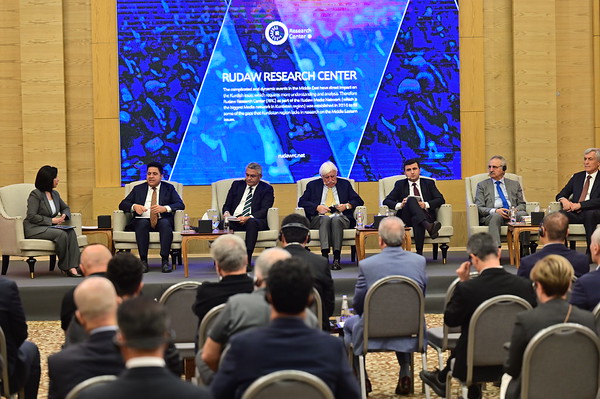
In a panel discussion, Bulent Kaya, parliamentarian from the Felicity Party and member of the "National Unity, Brotherhood and Democracy Support Committee," Oğuz Kaan Salıcı, parliamentarian from the Republican People's Party (CHP)–Istanbul, Cengiz Çandar, parliamentarian from the People's Democratic Party (DEM)–Diyarbakır, Mala Bakhtiyar, politician, Roj Girasun, general director of the Research Center (RAWEST), and Bayram Bozyel, chairman of the Kurdistan Socialist Party (PSK), shared their perspectives on the resolution process and the disarmament of the Kurdistan Workers' Party (PKK).
Bülent Kaya – Felicity Party (Saadet Partisi) Parliamentarian
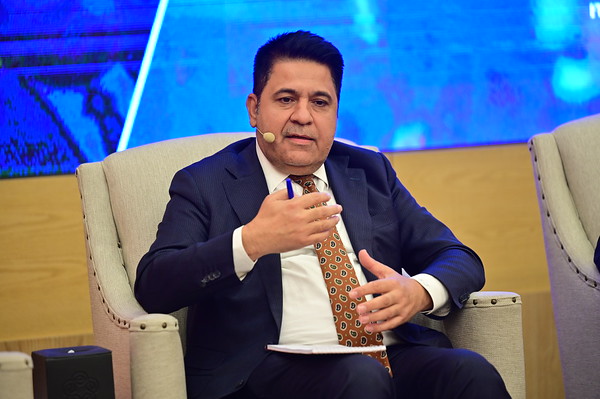
Bulent Kaya, parliamentarian from the Felicity Party and member of the "National Unity, Brotherhood and Democracy Support Committee," who participated in Rudaw’s conference, presented his party’s view on the process.
Kaya explained that in the first peace process (2009–2012), the main focus was on freedom, democracy, and opening up to Kurds. However, in the new process that began on October 1, 2024, security and military conditions have taken precedence.
He said: "A security and military need arose for starting the process. In other words, security and military issues were the first priority of the needs for starting the process."
Kaya emphasized that the current process is directly linked to the security situation and changes in Syria, particularly in the north of the country. The main condition for success has been the PKK’s dissolution and disarmament.
On February 27 of this year, following negotiations with a DEM Party (People’s Democratic Party) delegation, Abdullah Öcalan called on the PKK to dissolve and lay down arms. In May, the PKK decided to end its armed struggle, and on July 11, thirty PKK guerrillas symbolically burned their weapons in Sulaymaniyah province.
According to Kaya, the current expectation is to accelerate genuine and complete disarmament. It is also expected that significant changes will take place in northern Syria to ease the Republic of Türkiye’s concerns.
Kaya noted another difference between this process and past efforts: the formation of the "National Unity, Brotherhood and Democracy Support Committee" in parliament, whose work has so far been conducted with the cooperation and agreement of all parties. This committee has met seven times with different groups and stakeholders, and in its most recent meeting on the 28th of this month, it hosted former speakers of the Turkish parliament.
Kaya said: "The Turkish government only deals with the process within a narrow security and military framework and limits it to guerrilla disarmament, but other opposition parties who are members of the committee, apart from paying attention to disarmament, believe that freedoms, laws, rights and equality should be given as much importance as security and military issues."
He also stressed that one of the committee’s sensitive and important topics is making the necessary legal preparations, administrative changes, and addressing various issues to resolve the root causes of conflict and violence.
According to Kaya, parliament has been compelled to work through negotiation and dialogue rather than relying on majority versus minority rule. He described this as an opportunity to resolve future problems in a multidimensional way.
Kaya revealed that the state and İmralı (Abdullah Öcalan) are currently engaged in direct negotiations to ensure that the disarmament process proceeds in an organized manner, following the phased plan prepared by the PKK.
He added that serious efforts are also being made on the Syrian front to ensure that the Republic of Türkiye’s red lines are respected and its concerns addressed. These issues are subsequently brought before the committee, where legal, political, administrative, and psychological work is undertaken.
Kaya suggested that the authorities should also take practical steps, such as ending the policy of appointing trustees to municipalities and returning them to elected representatives, in order to "establish good faith and a visible ground for much greater steps."
Oğuz Kaan Salıcı – Republican People's Party (CHP) Parliamentarian
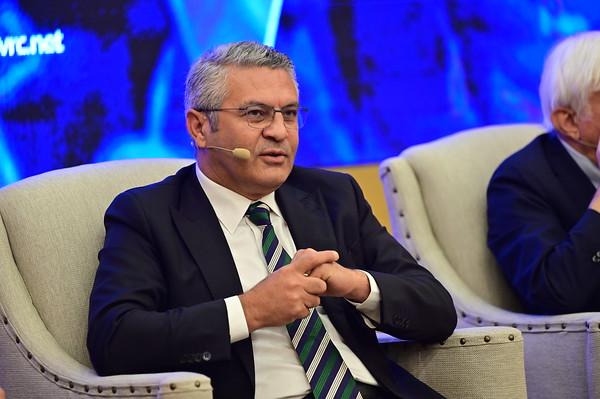
Oğuz Kaan Salıcı, parliamentarian from the Republican People's Party (CHP) representing Istanbul, stated that the Kurdish issue is increasingly becoming state policy.
Salıcı, who participated in the panel as a guest, began his remarks by noting that this was his third visit to Erbil and that each time he witnessed the city’s progress. He said: "The Middle East is also changing. As Erbil changes, the Middle East also changes. Because the world is changing. For that reason, the Republic of Türkiye must be able to harmonize itself with the changes in the Middle East and the world."
Recalling the peace process of 2013–2015, Salıcı rejected claims that the CHP opposed it: "The Republican People's Party did not oppose the process. The Republican People's Party believed in the process. Our general chairman at that time, Mr. Kılıçdaroğlu, had said: 'Even if I know it will end my political career, we believe in this process. We want this process to move forward.'"
Salıcı described state policy in these terms: "State policy thinks that the issue must be resolved, even if a term of power passes." He cited the Cyprus issue and the European Union membership process as examples of enduring state policy, and pointed to the IRA negotiations that began under John Major in the United Kingdom and concluded under Tony Blair’s Labour government as further evidence. He announced that the CHP supports the peaceful completion of the process.
Salıcı also addressed the constitutional issue, noting that while the commission has not yet taken it up, it will eventually create a framework for resolving it. He emphasized that constitutional and legal discussions will later be held in the Turkish parliament.
He further highlighted the security situation in the region, referencing recent events such as the Israel-Gaza war, developments in Lebanon, regime change in Syria, and the Iran-Israel war over the past year and a half.
Salıcı said: "The direction is toward border changes" and stated that in such an environment, the Republic of Türkiye’s efforts to safeguard its security and resolve issues through understanding with Kurdish populations outside its borders is "meaningful and correct." While recognizing that the issue is not only about security but fundamentally about social peace, he also underlined the importance of security in recent years.
Finally, he added that "the improvement of the Syria process (meetings between the SDF and Damascus) has the potential to positively affect the Republic of Türkiye’s process."
Cengiz Çandar – People's Democratic Party (DEM) Parliamentarian
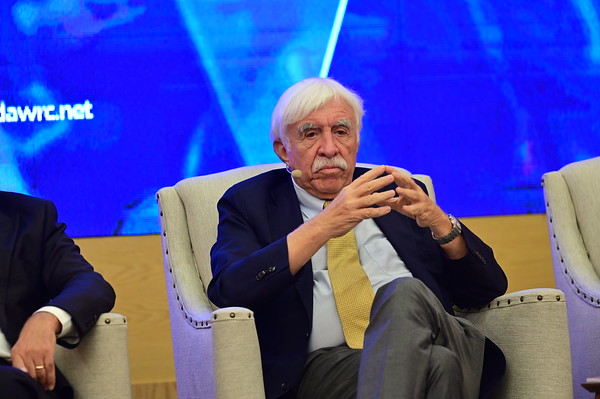
One of the participants in the conference and panel was journalist, writer, and People's Democratic Party (DEM) parliamentarian from Diyarbakır, Cengiz Çandar, who stated that opportunities for peace have been lost several times throughout history. He emphasized that until democracy is prioritized, the Kurdish problem will not be resolved.
In his remarks, Çandar referred to past experiences concerning the Kurdish issue and recalled a memory with former Turkish President Turgut Özal, saying that "Özal, after the 1991 Gulf War, made him responsible for correcting relations with Kurdish leaders."
Çandar explained that the meetings in London with Jalal Talabani, Mohsin Dizayi, and Latif Rashid were an important step in breaking a historical taboo. He added that Talabani later met with Abdullah Öcalan on March 16, 1993, and witnessed the first ceasefire.
Çandar said: "When we look at Abdullah Öcalan's messages from 1993, we see that several peace opportunities have been lost." According to him, during the past 32 years the main reason for the failure of peace efforts has been the "lack of will," and the Republic of Türkiye has lacked the determination to resolve the issue.
The DEM parliamentarian also spoke about the Oslo meetings and the 2013–2015 peace process, noting that they too were unsuccessful for the same reason. Çandar pointed out that in the current situation there is only "an unstable will" for resolution. He described Abdullah Öcalan's call to lay down arms as "announcing a very strong will" and added: "Abdullah Öcalan made the weapons be laid down." Çandar also praised Devlet Bahçeli's leadership in this process, calling it very valuable.
He underlined that this process does not resolve the Kurdish problem but rather opens the door to resolution. Çandar continued: "We are ending the greatest uprising in the history of Kurds in Türkiye, not resolving the Kurdish problem."
Mala Bakhtiar – Politician and Former Member of the Political Bureau of the Patriotic Union of Kurdistan
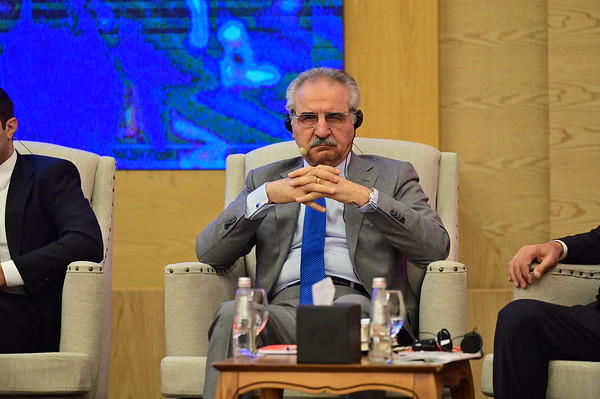
Mala Bakhtiar described achieving peace in the Republic of Türkiye as a "difficult" process, attributing this to the fact that "throughout history, Türkiye has had a mistaken understanding of the Kurdish issue and democracy."
According to him, "When an undemocratic mentality dominates those in power, it creates undemocratic public opinion as well. Creating a democratic alternative to that public opinion is difficult."
Bakhtiar referred to the laying down of arms by 30 PKK guerrillas in the Jasana cave in Sulaymaniyah on July 11 this year and asked: "Why don't they ask why they took up arms? I believe no nation in the Middle East seeks peace and freedom as much as the Kurds do."
He further stated: "If Türkiye and all states in the region investigate the causes of Kurdish armed struggle, they will know that if freedom and the right to self-determination are given to any nation, there will be no resort to weapons."
Bakhtiar explained that during the Cold War, when the West and East were competing for influence, "Kurds in all four parts of Kurdistan suffered the greatest disasters. During the Cold War, democracy suffered the greatest losses in the Middle East."
He indicated that the current situation of the Kurds, along with the crises and complications in the Middle East, will undergo changes, "because the strategy of the West and America in the era of globalization requires changing the current design of the region. As long as this unrest exists, the region will not see stability and the world economy has fallen into danger."
The new peace process began on October 1 of last year with the initiative of Devlet Bahçeli, leader of the MHP. Later, on February 27 of this year, Abdullah Öcalan called on the PKK to hold a congress and lay down arms.
Bakhtiar also highlighted the Kurdistan Region's role in advancing the peace process, saying: "Our interest lies in peace in our surroundings, because due to the liberation struggles that existed in northern, western, and eastern Kurdistan, we were always under pressure from Iran, Türkiye, and Syria."
Regarding the Kurdistan Region's strategy toward regional relations, he added: "Contrary to bringing pressure on us, we adopted a very logical policy toward all regional states. We have the best commercial relations with Türkiye and Iran, and we have not indebted ourselves to Syria in that regard either."
Referring to the establishment of the Republic of Türkiye in 1923, Bakhtiar said: "I wish that at the time of its establishment, it had implemented 25% of its democratic objectives, but instead it became part of the plan to eliminate the Treaty of Sèvres and impose the Treaty of Lausanne. For a full 100 years, Türkiye has been making sacrifices due to the Kurdistan war and has suffered great losses."
According to him, there is indeed a desire to resolve the Kurdish issue in the Republic of Türkiye, "but there is still no democratic will. Democracy is a historical, economic, political, social, and ideological process. If democracy is not systematic and is not incorporated into the constitution, it cannot be achieved through negotiation and disarmament alone."
Bakhtiar said it is in Türkiye's interest to resolve the Kurdish issue as soon as possible and added: "We too, as the Kurdistan Region and all Kurdish parties, despite all differences, believe it is in our interest that even if it takes several stages, the issue should be ended with genuine democracy."
He concluded by saying that the era of armed struggle after the Cold War has ended, and "after the war, none of the armed struggles in the parts of Kurdistan achieved their strategic objectives."
Roj Girasun – General Director of Türkiye's RAWEST Research Center
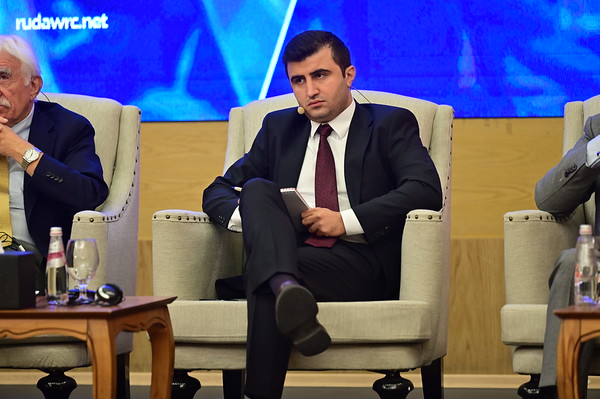
Also at the panel, Roj Girasun, General Director of Türkiye's RAWEST Research Center, presented statistics regarding Turkish and Northern Kurdistan public opinion on the peace process.
According to him, the new peace process differs from previous ones: "This difference is evident to some extent within public opinion and society."
Girasun explained that when the process began on October 1, "Kurdish public opinion, like Turkish public opinion, was bewildered, because over the past 10 years, security policy had become the state's main policy on the Kurdish issue."
He noted: "Initially, nearly 50% to 60% of Kurdish public opinion supported and hoped for the process. We can say that from that day on, Kurdish parties and the majority of Kurdish people showed great support, but due to the ambiguity of the process, their hope for the process's success did not increase."
He added that Kurds in Kurdish cities were tired and wanted the peace process to reach a conclusion: "That is, more than hope, their fatigue was evident."
According to RAWEST’s data, regarding Turkish public opinion on the peace process, "initially support was low, but (after the first group of guerrillas laid down their weapons), support increased day by day."
Girasun noted, however, that "contrary to the high support of Turkish public opinion for the process, confidence in its success is low." He explained: "Government supporters, AKP and MHP, do not believe the PKK will lay down arms. Similarly, opposition supporters view the peace process as an [electoral] campaign."
He added: "Kurds also have little confidence in the current situation in Türkiye that they will be given their democratic and legitimate rights."
Girasun concluded by saying that compared to the past, Kurdish public opinion and Kurdish political parties are more prepared for the peace process, and "except for marginalized racist parties, no one in Türkiye opposes the process."
Bayram Bozyel – President of the Kurdistan Socialist Party (PESEKA)
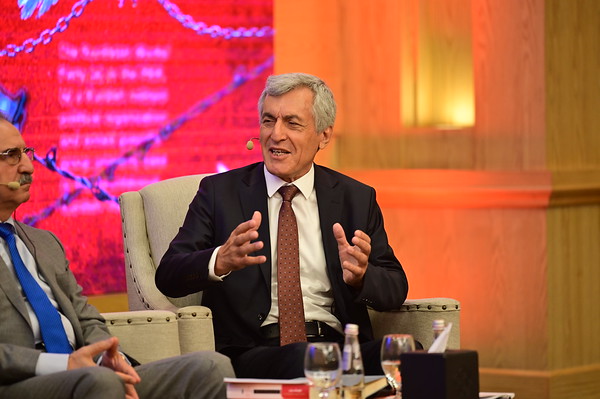
Another panel participant was Bayram Bozyel, President of the Kurdistan Socialist Party (PESEKA), who identified the changes in the Middle East as the reason for the initiation of the peace process.
Bozyel referred to the PKK’s disarmament, stating: "We see it as a good step, all Kurds are pleased with it, especially in Southern Kurdistan, because the brunt of the war was on this region."
According to him, the PKK's disarmament is not only an internal issue for the Republic of Türkiye but also has regional implications: "When the PKK was fighting, it had an impact on all four parts of Kurdistan. Now that it lays down arms, it will have a positive impact."
Recalling the disarmament of 30 PKK guerrillas, Bozyel said: "Türkiye needs to take the next step and prepare the ground for the process to move forward."
He explained that a parliamentary committee named National Support, Brotherhood, and Democracy has been established to conduct affairs related to the peace process and to present legislative proposals. Bozyel considered the formation of the committee a positive step.
At the same time, he observed shortcomings in its work: "There is ambiguity in managing the process and people have become confused. The process should be conducted within the framework of preparing a new constitution, and a distinction should be made between the Kurdish issue and the PKK issue, because the issue is not just the PKK."
Bozyel emphasized that the parliamentary committee for the peace process should also take into account the views of Kurdish parties outside parliament, as well as intellectuals and political figures.

